Cast Your Vote: How Should the United States Respond to Escalating Tensions in Syria?
Politicians were plagued with questions on foreign policy last week as the relationship between the U.S. and Russia continued to deteriorate.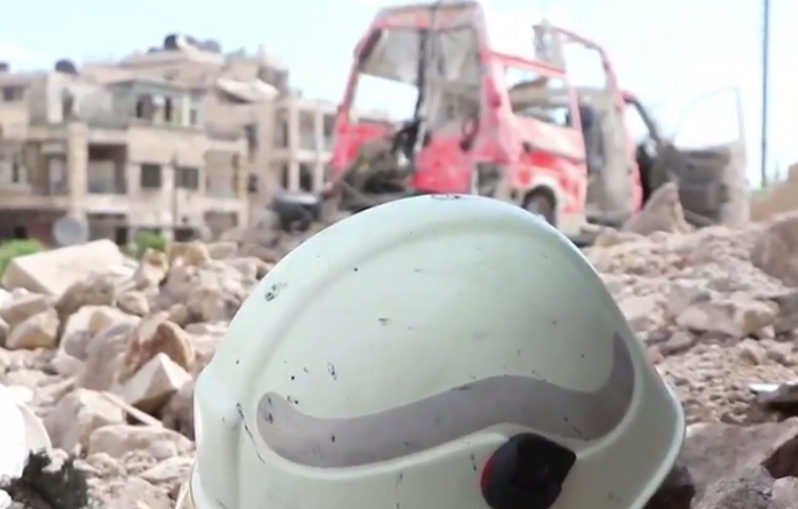
The White Helmets group working in Aleppo, Syria, has become a major focus of the conflict in Syria. (Screen shot via Al Jazeera)
Last week kicked off with some unconventional coverage of the first vice presidential debate. Normally, running mates are largely under-covered during campaign season, but because this election year is anything but normal, all eyes were on Tim Kaine and Mike Pence during Tuesday night’s debate.
One of the major themes of the debate—besides the candidates’ inability to keep to the question—was foreign policy. Truthdig’s Kasia Anderson, who live-blogged the event, wrote:
When faced with the prospect of talking about Syria, Pence launched into a discussion of Hillary Clinton’s email scandal. [CBS moderator Elaine] Quijano repeatedly reminded Pence of the original question.
Kaine spotted an opening in Pence’s answer on what to do about the international refugee crisis stemming from the war in Syria and other arenas of conflict. Kaine cast his and Clinton’s plan to vet refugees as supportive and unbiased compared to Trump’s proposed blockade. “We won’t do it based on the country you come from or the religion you are,” Kaine said. Pence replied, again using potentially risky language, “We can’t know who these people are coming from Syria.”
In his defense of statements he and Trump had made about Russian President Vladimir Putin, Pence cast Trump as a “strong leader” capable of protecting his country via a safety-through-strength leadership style. As for Russia, Pence said, “provocations by Russia need to be met by American strength.”
Kaine baldly called Putin a dictator and taunted his challenger: “If you don’t know the difference between dictatorship and leadership, then you have to go back to a fifth-grade civics class,” he said. In singing the praises of the Clinton Foundation, Kaine turned the tables on Donald Trump’s own foundation for supporting Russian interests and making illegal donations on the domestic level.
Their arguments on Russia and Syria came during a crucial week of foreign policy developments. Violence has been increasing in East Aleppo, so much so that the United Nations’ special envoy for Syria felt the need to get personally involved. Meanwhile, the United States and Russia continue an international stare-down over the politics of the country.
On Monday, the U.S. suspended talks with Russia over alleged Russian bombing of Aleppo. This announcement came just days after Russia warned the U.S. of the “terrible, tectonic consequences” of interfering with the Syrian regime.
Meanwhile, fears of Russian interference in the U.S. election are on the rise as November approaches. Many in the mainstream media are promoting anti-Russian sentiment. In his piece “What’s Behind Time Magazine’s Putin Demonizing?” journalist David Swanson writes:
[T]he Russia-did-it stories that were used to bury the DNC-rigged-its-primary stories rather shockingly blurted out in major corporate U.S. media what I’ve just been saying. For a while it seemed acceptable to be aware that U.S. elections are faith-based as long as it helps build up hostility with Russia. Now, however, we’re being told of our duty to remain firm in our faith.
Robert Parry of Consortium News seems to agree. “Through an endless barrage of ugly propaganda, the U.S. government and the mainstream American press have put the world on course for a potential nuclear showdown with Russia,” he writes. “In many ways, the Western insistence on ‘regime change’ in Syria ties in directly to the extraordinary escalation of that strategy to seek ‘regime change’ in Russia.”
So Tuesday night’s debate questions on Syria came at a crucial juncture. And while vice presidential nominees usually stay out of the headlines, Pence surprised many with his position on the Russian-Syrian relationship. “The biggest Middle East news to come out of the VP debate was that Mike Pence advocated that the US strike ‘military targets of the Assad regime’ as a way of punishing Russia for its participation in the campaign to take East Aleppo from the mostly fundamentalist rebel groups now holding it,” Truthdig contributor Juan Cole explains. “Tim Kaine’s only real response was to agree with Pence that the US should establish a humanitarian zone in Syria. But he did not offer specifics about Syria.”
In the past, Kaine has criticized President Obama’s policy in Syria, although Hillary Clinton’s plans have been labeled “more hawkish.” When asked during Tuesday’s debate why Russia was so difficult,” “Kaine responded that [Russian President Vladimir] Putin was a dictator but the U.S. had to work with him on some issues while opposing him on others.” Not exactly solid propositions from a vice presidential nominee.
Although the vice presidential debate included only two nominees, third parties were eager to add to the conversation. Libertarian presidential nominee Gary Johnson continues to struggle to answer foreign policy questions during interviews, and thus his running mate, Bill Weld, has been forced to navigate the political fallout.
Ajamu Baraka, Jill Stein’s Green Party running mate, appeared on Democracy Now! to “debate” Kaine and Pence in real time. Here’s what he had to say about the situation in Syria:
This is a very dangerous conversation. What we are seeing from both candidates, of both—of both parties, is a commitment to go to war. You know, it’s very disheartening to see the kind of images coming from the conflict in Syria. But that conflict had a genesis. It didn’t just emerge out of thin air. And not to get into the details of how this conflict evolved, I think it’s important, though, to say that, you know, the U.S., their hands are not—are not clean, that this notion that the U.S. was standing on the side and not involved, that narrative is a false narrative.
And this idea that the collapse of the last cease-fire can be put at the foot of the Russians is, in fact, [an] outright lie. Now, that may be painful for folks who are not following the situation very closely, but it is, in fact, a fact, that, basically, the Pentagon undermined the agreement, the cease-fire agreement, that was negotiated by John Kerry, when they attacked the Syrian army and killed 62 of their soldiers, when they attacked a known site. That was the effective collapse of that cease-fire.
So, going into Syria and establishing a humanitarian zone, we’re talking about an act of war. Where is the legitimacy for that? The U.S. has no legitimacy to be operating in that territory. And this plan on both the Democrat side and the Republican side to take the U.S. back into a war—because when you’re talking about [an] intervention, you’re talking about boots on the ground. Another war? The American people are tired of this. And I don’t think they’re going to go for the justification for intervention again into this conflict.
Another key topic in this week’s political news was the White Helmets of Syria, who have been championed by mainstream media as sole peacekeepers in a war-torn region. Scott Ritter points out a political angle to this coverage, however, noting, “the public face of the White Helmets is one that is strictly anti-Assad in nature.” He continues:
The imposition of a no-fly zone over northern Syria has been a rallying cry of those who advocate regime change in Damascus—it has been a central tenet of the Erdogan government in Turkey and a favorite policy position of former Secretary of State Hillary Clinton. Key to such a policy is the argument that the Syrian air force (and, since September 2015, the Russian air force) has been systematically slaughtering Syrian civilians with indiscriminate bombing. The White Helmets have played a major role in facilitating this argument, constantly imploring whoever will listen to implement a no-fly zone to protect the people of Syria from the horrors of Assad’s ubiquitous barrel bombs.
Based on the political dialogue that emerged during the week, we turn to you, our readers. How should the United States respond to escalating tensions in Syria? Should the U.S. begin strikes on the Assad regime “as a way of punishing Russia,” as Pence suggested? Or should the U.S. empower Syrian opposition, steps that could be taken by a Clinton administration now that cease-fire talks have halted?
Should “safe zones” be established, as suggested by Kaine? Or, as Baraka suggested, should the U.S. resume peace talks to “de-escalate the conflict in Syria and across the Middle East”?
One vote per person, please. (Make your selection and then click on “Vote.” To see results of the polling, click on “Results.”)
Independent journalism is under threat and overshadowed by heavily funded mainstream media.
You can help level the playing field. Become a member.
Your tax-deductible contribution keeps us digging beneath the headlines to give you thought-provoking, investigative reporting and analysis that unearths what's really happening- without compromise.
Give today to support our courageous, independent journalists.
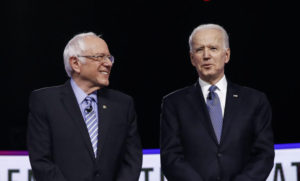
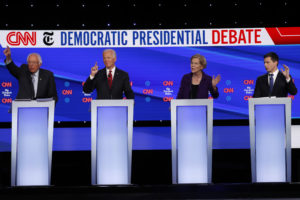
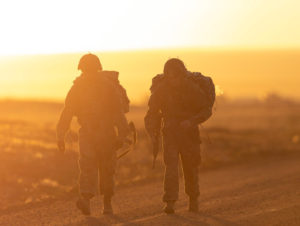
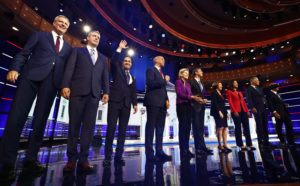
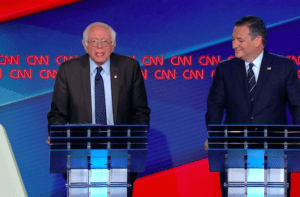
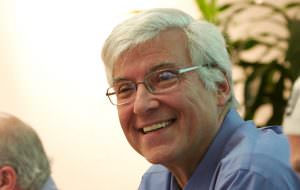
You need to be a supporter to comment.
There are currently no responses to this article.
Be the first to respond.